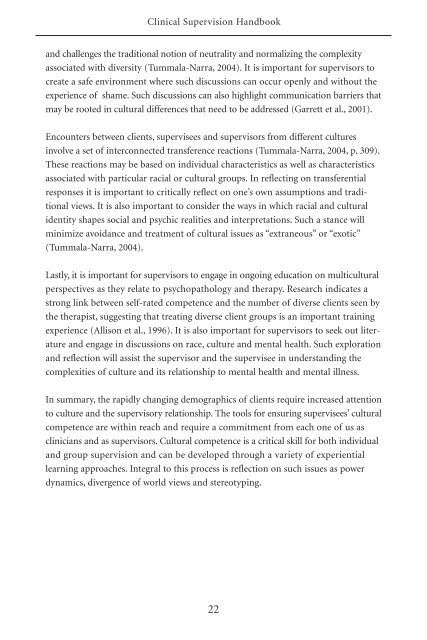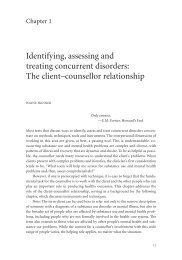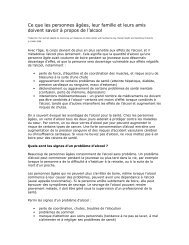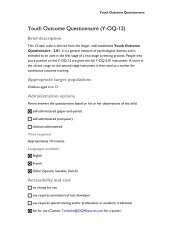Clinical Supervision Handbook - CAMH Knowledge Exchange ...
Clinical Supervision Handbook - CAMH Knowledge Exchange ...
Clinical Supervision Handbook - CAMH Knowledge Exchange ...
You also want an ePaper? Increase the reach of your titles
YUMPU automatically turns print PDFs into web optimized ePapers that Google loves.
<strong>Clinical</strong> <strong>Supervision</strong> <strong>Handbook</strong><br />
and challenges the traditional notion of neutrality and normalizing the complexity<br />
associated with diversity (Tummala-Narra, 2004). It is important for supervisors to<br />
create a safe environment where such discussions can occur openly and without the<br />
experience of shame. Such discussions can also highlight communication barriers that<br />
may be rooted in cultural differences that need to be addressed (Garrett et al., 2001).<br />
Encounters between clients, supervisees and supervisors from different cultures<br />
involve a set of interconnected transference reactions (Tummala-Narra, 2004, p. 309).<br />
These reactions may be based on individual characteristics as well as characteristics<br />
associated with particular racial or cultural groups. In reflecting on transferential<br />
responses it is important to critically reflect on one’s own assumptions and traditional<br />
views. It is also important to consider the ways in which racial and cultural<br />
identity shapes social and psychic realities and interpretations. Such a stance will<br />
minimize avoidance and treatment of cultural issues as “extraneous” or “exotic”<br />
(Tummala-Narra, 2004).<br />
Lastly, it is important for supervisors to engage in ongoing education on multicultural<br />
perspectives as they relate to psychopathology and therapy. Research indicates a<br />
strong link between self-rated competence and the number of diverse clients seen by<br />
the therapist, suggesting that treating diverse client groups is an important training<br />
experience (Allison et al., 1996). It is also important for supervisors to seek out literature<br />
and engage in discussions on race, culture and mental health. Such exploration<br />
and reflection will assist the supervisor and the supervisee in understanding the<br />
complexities of culture and its relationship to mental health and mental illness.<br />
In summary, the rapidly changing demographics of clients require increased attention<br />
to culture and the supervisory relationship. The tools for ensuring supervisees’ cultural<br />
competence are within reach and require a commitment from each one of us as<br />
clinicians and as supervisors. Cultural competence is a critical skill for both individual<br />
and group supervision and can be developed through a variety of experiential<br />
learning approaches. Integral to this process is reflection on such issues as power<br />
dynamics, divergence of world views and stereotyping.<br />
22

















